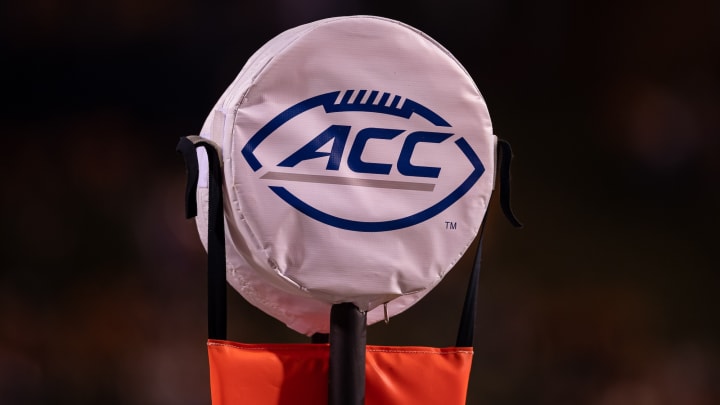ACC Claims Florida State Should Be Excluded From Conference Business in Amended Lawsuit

The Atlantic Coast Conference filed an amended lawsuit against Florida State on Wednesday, citing “serial breaches of critical legal promises and obligations,” as the league continues its proactive stance in a legal battle over a grant of media-revenue rights.
The Seminoles are seeking to create a financially viable exit ramp from the conference they’ve been a member of since 1991.
The ACC, which filed the first of two dueling December lawsuits over the grant-of-media-rights agreement between the conference and Florida State, says it is seeking a declaratory judgment that its grant of media rights are valid and enforceable contracts. The league also is seeking “damages” for alleged violations of league bylaws “in an amount to be proven at trial but which the Conference believes will be substantial.”

The updated complaint has three primary additions underscoring its breach-of-contract claim:
- FSU is violating an agreement league members signed twice, that the grant of rights at the heart of the dispute is “irrevocable” and one it agreed not to challenge. “[T]he ACC seeks a declaration that its Grant of Rights, which Florida State agreed to on two separate occasions, is valid and enforceable,” per the complaint filed Wednesday.
- FSU committed a breach of duty as a league member and may need to be excluded from ACC business. “Despite its actions and clear, direct and material conflict of interest, Florida State continued and continues to participate in the management of the Conference,” the complaint said. “Thus, Florida State participates in deciding fundamental policy questions for the Conference, even as it breaches its contracts and seeks to undermine the Conference’s objectives and purpose.”
The ACC requested “a permanent injunction barring Florida State from participating in the management of the affairs of the Conference while it has a direct and material conflict of interest with the purposes and objectives of the Conference.”
- FSU breached the confidentiality agreement with the league and broadcast partner ESPN by making public financial terms of the ACC’s deal with the network. The ACC is seeking a permanent injunction to bar Florida State from disclosing that information.
“Put simply, Florida State takes the position that it is bound by a contract only so long as it chooses,” the ACC’s amended complaint stated.
A Florida State spokesman told Sports Illustrated the school was aware of the amended suit and had no further comment.
This is the latest legal maneuvering in what projects to be a yearslong battle if both sides remain steadfast and the cases proceed to one or more trials. In anticipation of Florida State’s lawsuit that was filed Dec. 23, the ACC beat the school to the punch with its own suit that claimed the Seminoles were violating their obligation to abide by an agreement which tied ESPN media revenue to the league through 2036. FSU filed later that day, alleging restraint of trade, breach of contract and failure to perform by the ACC, citing a stagnant revenue stream and “draconian” penalties for withdrawing from the conference.
The ACC filed its suit in North Carolina, where the headquarters are located, and Florida State filed in Florida. Jurisdiction is considered a significant element of this legal tussle, legal experts familiar with the situation told Sports Illustrated Wednesday, with each side seeking a home-field advantage of sorts. One said the jockeying over jurisdiction could last another six to nine months.
The dispute could continue on two tracks in two states, or one court could ultimately defer to the other. In that respect, the ACC’s move to land the first punch could be a factor down the road. “It was important to file and serve first,” one lawyer said.
The mechanics of the Florida State–ACC dispute were set in motion last February when the FSU Board of Regents began openly discussing a move from the league, citing the growing revenue gap with the Big Ten and SEC, and the length of the ACC’s binding grant-of-rights agreement. By spring, as many as seven ACC schools were discussing potential breakaway options.
In response, the ACC approved a “success initiative” in mid-May to distribute revenue unequally, rewarding schools that achieved more in the postseason in football and men’s basketball. That calmed the waters for a time, but Florida State still wanted all of the league’s revenue to be distributed based on performance metrics.
An Aug. 15 deadline for departing the conference in time for the 2024-25 academic year came and went, but league sources believed it was just a matter of time before FSU tested the grant of rights. That belief deepened when the ACC added three new members—Stanford and California from the Pac-12 and SMU from the American Athletic—without garnering a “yes” vote from the Seminoles. The schools are entering the ACC at a discounted revenue rate, which would divert more money to the established league members, but not enough to sway Florida State’s opinion.
The final straw—or at least convenient excuse—for the Seminoles came when they were controversially snubbed from selection for the four-team College Football Playoff. Undefeated Florida State, which had lost star quarterback Jordan Travis to injury late in the season, later cited league membership as a factor in being bypassed in favor of Alabama of the SEC.
